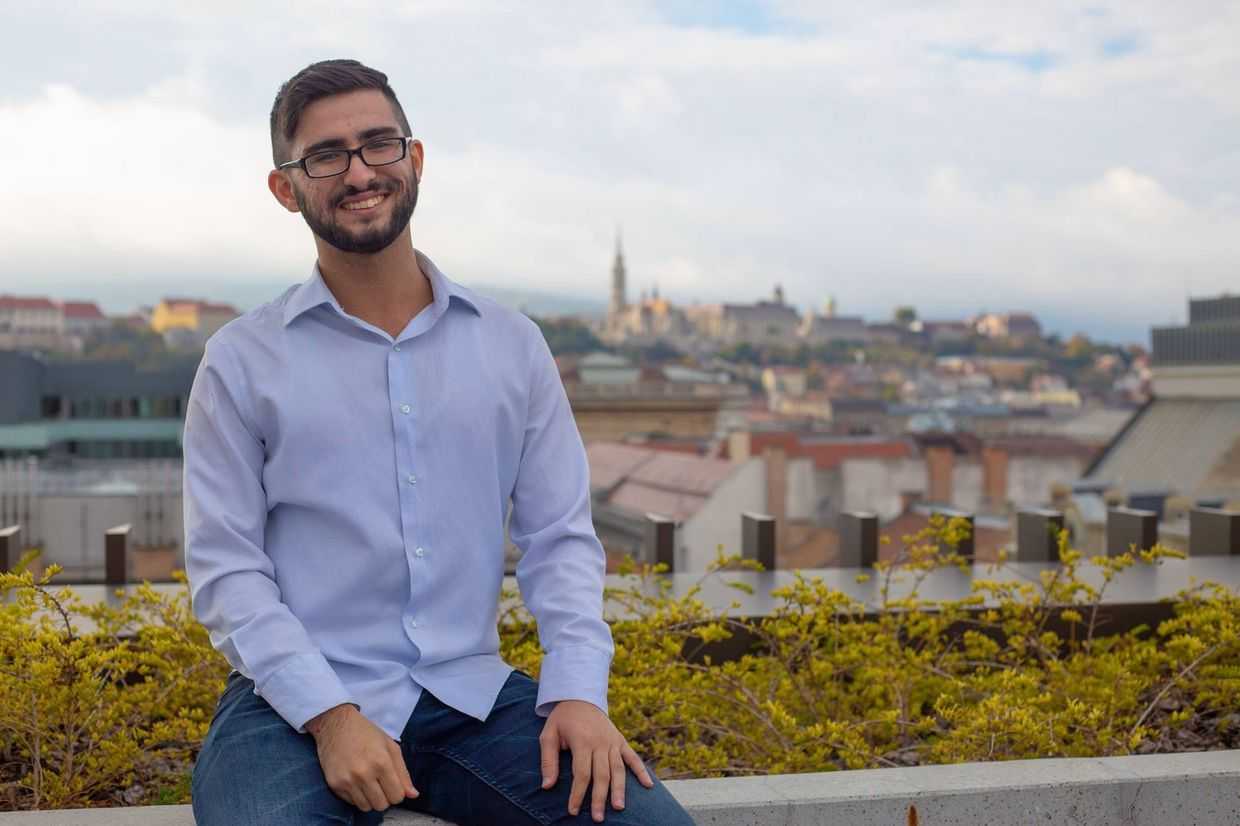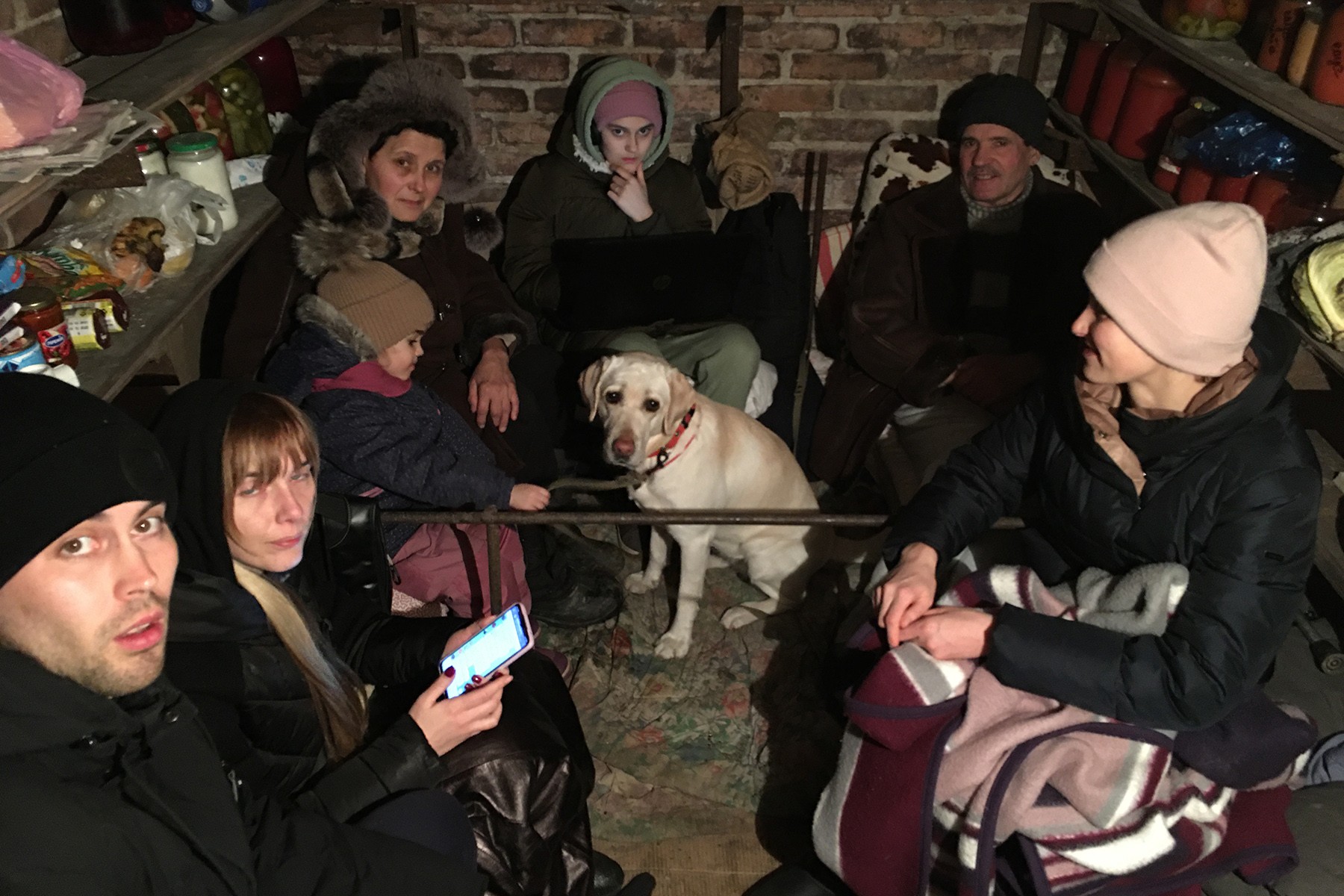
Tetiana Rovna escaped Bucha as Russian troops were advancing towards the Kyiv suburb. She told OC Media about her flight from Ukraine and what it has been like to witness her home ravaged by war from afar.
An air raid warning interrupts my quiet conversation with Tetiana Rovna as her phone receives a notification about incoming Russian airstrikes on the town of Kropyvnytskyi. An app created by the Ukrainian government urges her to quickly go to the nearest bomb shelter. She does not need to heed the instructions — our conversation is taking place a few thousand kilometres away, in Tbilisi, Georgia. But despite now living in safety, Tetiana still chooses to receive the notifications, her elderly parents are still in danger.
‘The [air-raid] siren turns on several times per day, it means they might attack. When it happens during the day I try to call my mom or dad. When it turns on at night — I just don’t sleep, neither of us does, neither I nor my sister’, Tetiana tells me.
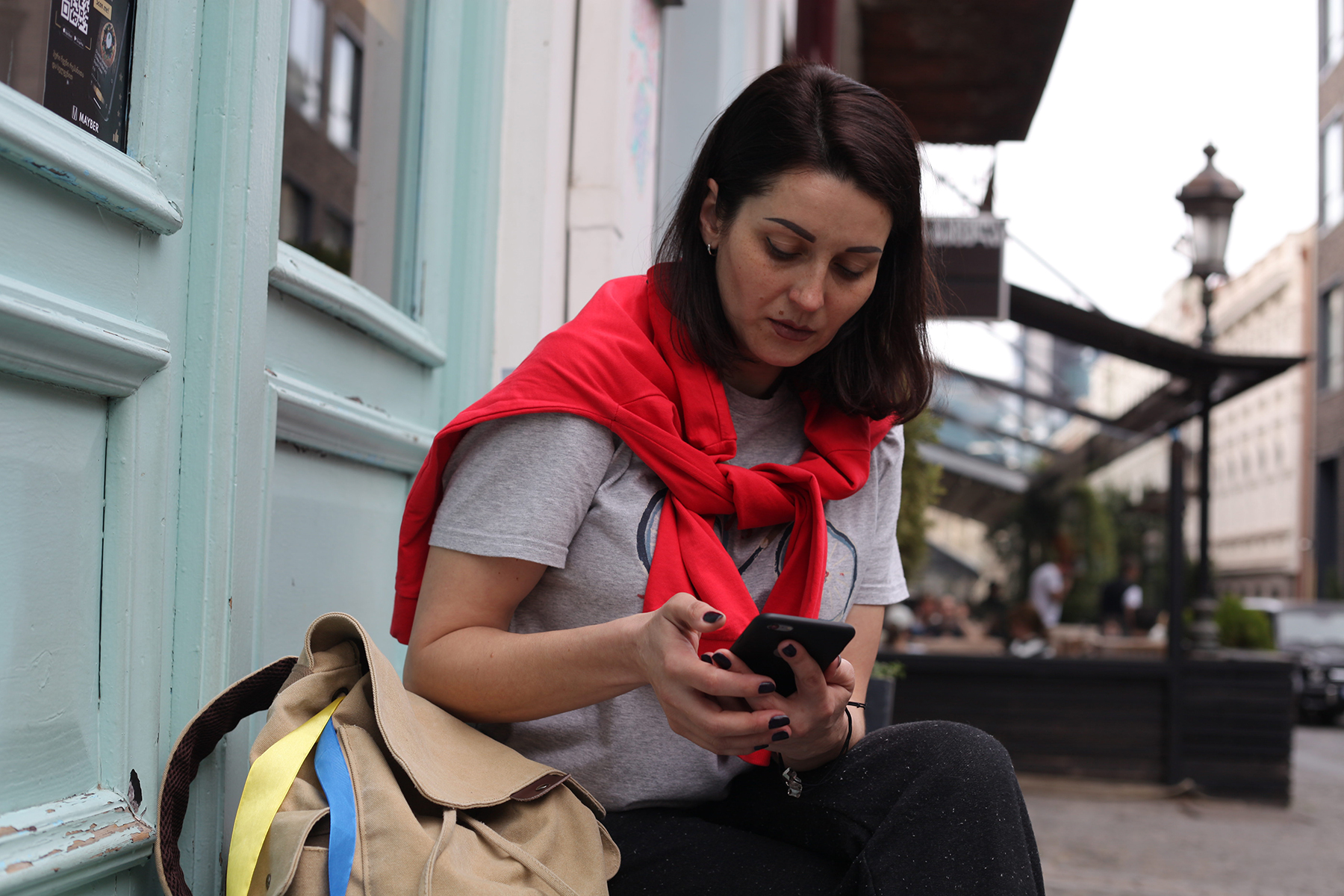
Tetiana was born near Kropyvnytskyi, but in recent years has been living in Bucha, a once-prosperous Kyiv suburb. She left Bucha on 24 February as Russian forces based in Belarus crossed the border and launched a blitzkrieg toward the Ukrainian capital of Kyiv.
Along with her, she took her 16-year-old daughter Sonya, her sister Iryna, and Katya, her sister’s 4-year-old daughter. Bucha fell to the Russians on 12 March and was occupied until Ukrainian forces retook it on 3 April.
The scenes of devastation left behind by the Russian army in Bucha have shocked the world: bodies left for weeks on the roadside, civilians with their hands tied behind their backs shot execution-style, alongside myriad stories of rape and torture from survivors.
Kropyvnytskyi is located in Ukraine’s Kirovohrad region, in the centre of the country and relatively far from the frontline. But this distance is not enough to spare the town from air raids and missile strikes, which have left no part of the country unscarred. Every air-raid notification she receives reminds her of the false sense of security she had felt when she first left Bucha to stay with her parents — unaware of the long journey still ahead of her.
As the raids on Kropyvnytskyi continued, Tetiana says she felt an overwhelming sense of powerlessness.
‘The scariest thing is when you are alive, and yet you cannot save your child if something happens. And when you look into the eyes of your parents and then your child and you fall apart, because you can do nothing.’
Her fear for her children reached an apex when, on 4 March, Russian forces shelled the Zaporizhzhia nuclear power plant — the largest nuclear power plant in Europe. Tetiana convinced her sister to take the children abroad after Sonya told her mother that she is not afraid of bombs and missiles, because ‘whatever will happen will happen quickly’, and that she really fears what could happen if the soldiers ‘can come into our home’.
‘“Her life depended on my decision’, Tetiana recalls. ‘I realised that I couldn’t forgive myself if something happened to her.’
And that is how Tetiana, along with her sister and their kids, became four more refugees among the 4.2 million Ukrainians who, according to the United Nations, have already fled their homeland.
‘Don’t cry’
I meet again with Tetiana on the following day, this time, she is joined by her younger sister Iryna Rakhnii and her daughter Katya. The two mothers proceed to tell me about the final leg of their journey out of Ukraine.
The sisters and their children left Kropyvnytskyi by train on 4 March, on a train bound for the western-Ukrainian city of Lviv. Upon arrival, they found a bus that took them across the border to Poland.
‘Imagine a field and you are alone there. You are standing there and you have nothing, only one bag with some stuff and that is it’, Iryna Rakhnii, Tetiana’s sister, explains how she felt upon first stepping on Polish soil.
Like so many others, Iryna says that did not believe the war would happen until the very moment it began, and even then she waited to see the carnage with her eyes before deciding to leave. She says her daughter, 4-year-old Katya, has had trouble sleeping, ever since the little girl was awoken by the sound of shells hitting a residential building near their home.
‘Back at the time, when I was watching the news and they were showing refugees, people who flee their homes, with suitcases, children, or without anything, I never thought that it would happen to me’, Iryna explains. ‘Then I found myself in the same skin.’
‘When, on the border, I saw a photographer taking a photo of Katya, I just wanted to hide from the whole world’, she adds, her voice shaky with emotion, tears welling in her eyes. At that moment Katya, who has been sitting quietly next to her mother, speaks up.
‘Don’t cry’, the girl says, as Iryna wipes tears from her cheeks.
‘I feel sorry for her when she cries’, the four-year-old tells me.
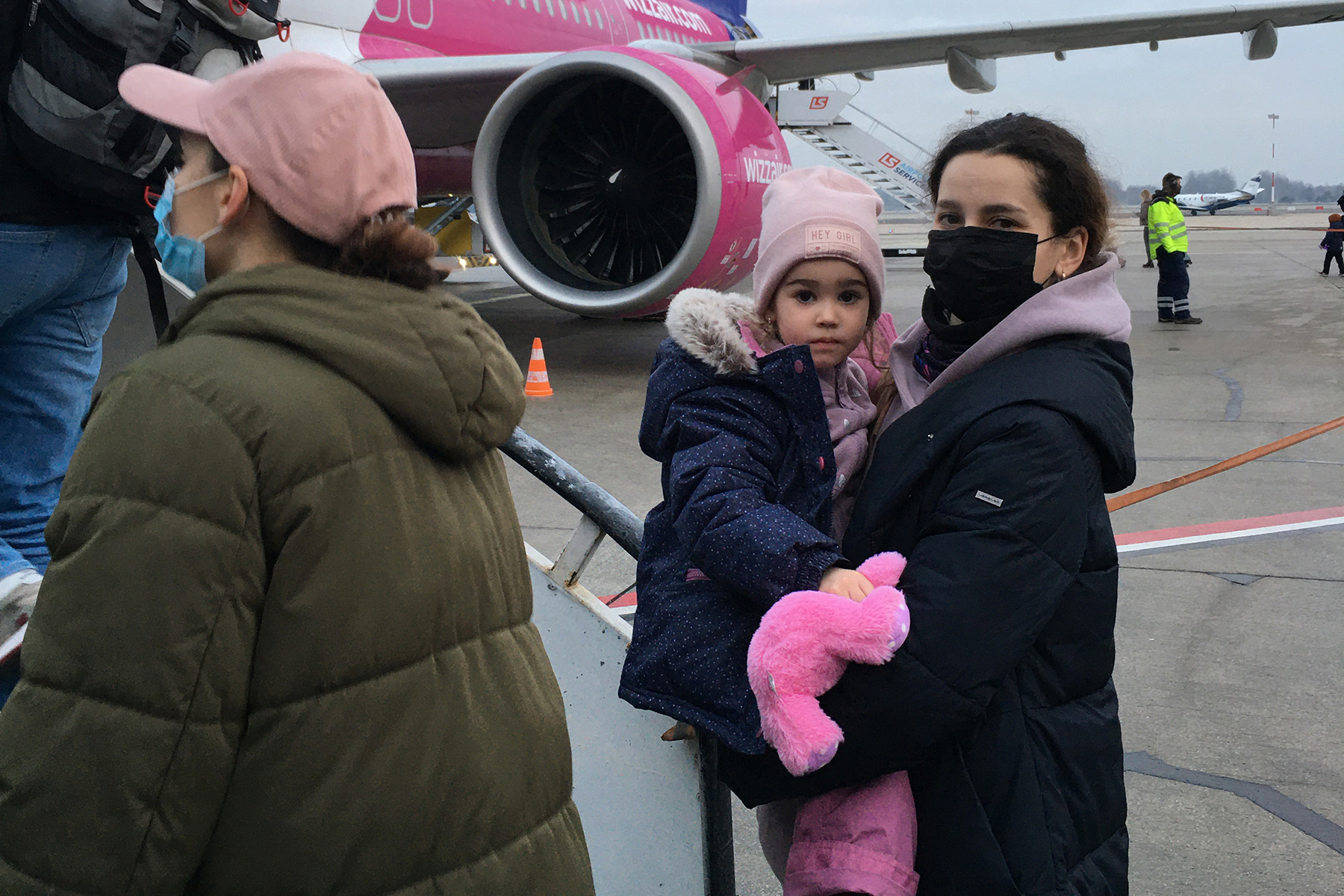
‘Mom, will the missiles reach us here?’
Katya has had many questions for her mother.
When they crossed the border into Poland and the adults were visibly relieved, the girl asked her mother whether the rockets could still reach them in this new country. Katya has also kept asking her mother when they will be able to return home, and when ‘will we go back to dad?’ This question, Iryna has no answer to.
Iryna and Tetiana still have many relatives in Ukraine, including their parents, and Iryna’s husband — martial law forbids men of military age from leaving the country.
The sisters left Poland on 8 March, flying from the city of Katowice to the western Georgian city of Kutaisi, where they were met by Tetiana’s Ukrainian ex-husband, Sonya’s father, who took them to Tbilisi.
Despite having been divorced for 10 years, Tetiana and her ex-husband — who lives in the Georgian capital — have maintained a good friendship, and he has since helped the sisters find accommodation and settle in their new home.
The Georgians, she adds, have also been incredibly welcoming.
‘The first day my daughter came to her new school in Georgia, the staff and classmates greeted her with the Ukrainian national anthem. That made me very emotional’, Tetiana says, adding that she felt ‘overwhelmed’ by the hospitality shown by the Georgian people and their staunch support of the Ukrainian people.
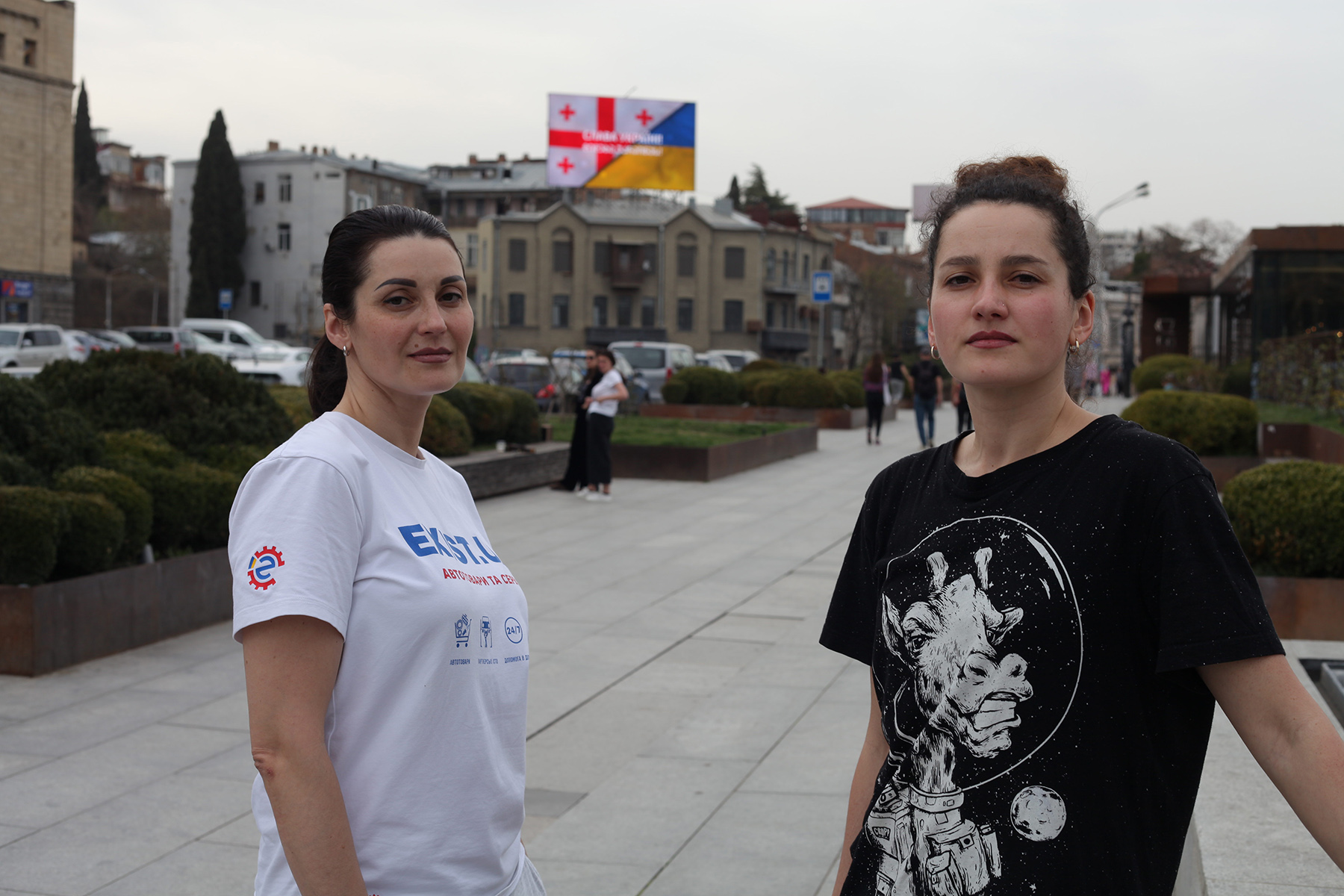
In Ukraine, Tetiana worked as a purchasing manager for a medium-sized enterprise but lost her job when the company ceased operation because of the Russian invasion. Now she hopes to find a job in Tbilisi — she has recently been offered a managerial position by a Ukrainian entrepreneur based in Georgia.
‘I want to work my fingers to my bones’, Tetiana tells me. ‘That will help me to stay calm because I don’t know how long we will stay here.’
The smell of home
Tetiana marked her 42nd birthday on 31 March. There was no birthday cake, no celebration. To keep alive a long-held tradition, Iryna gave her sister a bouquet of flowers.
‘She brought me a bunch of yellow narcissi and started to cry’, Tetiana recalled. ‘“Why are you crying?” I asked her, and she said “they smell like the ones at mom’s garden, they smell like home”.’
The only wish Tetiana said she made for her birthday is that her parents stay alive and that she will be able to return to them. When she was younger, she sometimes imagined a future for herself outside of Ukraine, but now as she sees the determination of her compatriots in the face of the Russian invasion she is sure that Ukraine is where she belongs.
‘People do understand that it’s dangerous, but they are going back, because it is their home’, she says. ‘We will be back. We will clean, we will rebuild, and we will sweep the streets together.’
Iryna, whose birthday is in November, tells me she is certain that they will celebrate her birthday back home, in Ukraine.


